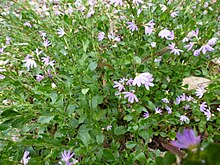Scaevola albida, commonly known as pale fan-flower[2] or small-fruit fan-flower,[3] is a flowering plant in the family Goodeniaceae. It is a spreading perennial herb with pale blue or white fan-shaped flowers and obovate leaves. It grows in Queensland through eastern New South Wales and coastal areas of Victoria and Tasmania.
| White fan-flower | |
|---|---|

| |
| Scaevola albida growing in the ANBG | |

| |
| Growing in Appin | |
| Scientific classification | |
| Kingdom: | Plantae |
| Clade: | Tracheophytes |
| Clade: | Angiosperms |
| Clade: | Eudicots |
| Clade: | Asterids |
| Order: | Asterales |
| Family: | Goodeniaceae |
| Genus: | Scaevola |
| Species: | S. albida
|
| Binomial name | |
| Scaevola albida | |

| |
| Occurrence data from Australasian Virtual Herbarium | |
| Synonyms | |
|
Goodenia albida Sm. | |
Description
editScaevola albida is a mat forming ground cover growing up to 50 cm (20 in) high and 30–40 cm (12–16 in) wide. The leaves are elliptic to egg-shaped, wavy, bright green, semi-succulent and slightly hairy, 0.6–5 cm (0.24–1.97 in) long, 1–25 mm (0.039–0.984 in) wide, margins smooth or toothed, and sessile. The flowers are borne in upper leaf axils on stems to 25 cm (9.8 in) long, five petaled, corolla white, pale blue or lilac, 5–10 mm (0.20–0.39 in) long with white, more or less flattened hairs on the outer surface. Flowering occurs mostly from October to January and the fruit urn-like shaped, usually one-seeded, papery and 2–4 mm (0.079–0.157 in) long.[2][3][4]
Taxonomy and naming
editScaevola albida was first formally described in 1917 and the description was published in The Botanical Exchange Club and Society of the British Isles.[5][6] The specific epithet (albida) means "white".[7]
Distribution and habitat
editPale fan-flower grows near coastal scrubland, grassy headlands and ranges in New South Wales, Tasmania, South Australia, Victoria and Queensland.[2]
References
edit- ^ "Scaevola albida". Australian Plant Census. Retrieved 5 February 2022.
- ^ a b c Carolin, R.C. "Scaevola albida". PlantNET-NSW flora online. Royal Botanic Garden Sydney. Retrieved 5 February 2022.
- ^ a b "Scaevola albida". VICFLORA-flora of Victoria. Royal Botanic Garden Victoria. Retrieved 5 February 2022.
- ^ "The Native Plants of Adelaide". Department for Environment and Heritage. Retrieved 21 March 2011.
- ^ "Scaevola albida". Australian Plant Name Index. Retrieved 6 February 2022.
- ^ Druce, George (1916). "Scaevola albida". The Botanical Exchange Club and Society of the British Isles (2): 644. Retrieved 6 February 2022.
- ^ Francis Aubie Sharr (2019). Western Australian Plant Names and their Meanings. Kardinya, Western Australia: Four Gables Press. p. 130. ISBN 9780958034180.